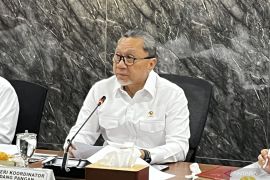"Psychologically it would make the market uneasy. Bank Indonesia has to raise the interest rate, by 25 or 50 basis points," Tony Prasetiantono said.Jakarta (ANTARA News) - With rupiah losing more value, the pressure is greater for Bank Indonesia to raise its benchmark interest rate.
Head of the Public Policy and Economic Study Center (PSEKP) of the Gadjah Mada University (UGM), A. Tony Prasetiantono, said Bank Indonesia needs to immediately raise its benchmark interest rate to prevent rupiah from sinking deeper against the U.S. dollar.
At a discussion here on Wednesday, Tony said that the central bank should be aware that the trend of low interest rate has been over and could not be maintained.
He said currently almost all countries have put behind the era of low interest rate, adding unless immediately responded the country`s foreign exchange reserve would be depleted.
"Psychologically it would make the market uneasy. Bank Indonesia has to raise the interest rate, by 25 or 50 basis points," he said.
He said the downtrend had gone long enough, that 25 basis point increase would not be enough.
"But raising 50 basis points at once is feared to cause psychological effect that the result could be contra-productive," he said.
The Indonesian currency closed at the level of 14,073 per U.S. dollar on Wednesday or a loss of 30 point from earlier level of 14,043.
Tony said the position of rupiah crossing the level of 14,000 per dollar is alarming psychologically that needs serious addressing .
"The market sees the situation similar to condition in 1998 although Indonesia still fares better than many other countries such as Argentina," he said.
A number of other economists and observers have expressed similar concern.
On Tuesday, economist Bhima Yudhistira from the Institute for Development of Economic and Financial (INDEF) called on the central bank to raise its benchmark interest rate "7-Day Reverse Repo Rate" to prevent foreign capital flight.
"The foreign exchange reserve would finally be depleted to stabilize rupiah. Bank Indonesia may not rely only on the foreign exchange reserve as an instrument," Bhima said.
He said Bank Indonesia still has room to raise its benchmark interest rate by 25-50 basis point from the present level of 4.25 percent.
Bank Indonesia Governor Agus Martowardojo has said adjustment is open in the benchmark interest rate when rupiah weakening becomes a threat to the stability of financial system or inflation target of 2.5-4.5 percent.
By the end of March, 2018, the country`s foreign exchange reserve was US$126 billion or 2.06 percent smaller than it was in the previous month.
On Monday, Senior Deputy Governor of the Central Bank Mirza Adityaswara said the falling value of the national currency in the past several week was only temporary.
"Rupiah has continued to weaken , but it would not crash as in 2013, as the country had succeeded in keeping the macro economic indicators well under control such as inflation and at the same time the government has continued to launch deregulation measures," Mirza said
He said the country is in the middle of a situation when the providers of foreign exchange in the world raised their interest rate and a number of central banks in the world already raised their interest rates.
The main cause of the volatility of the currency is the policy of the U.S. central bank, The Federal Reserve, which raised its benchmark interest rate (Fund Rate) last March. The Fed still plans to gradually raise the Fund Rate two more times this year.
The Central Bank sees that the U.S. interest rate would still climb up until it reached 3 percent from now 1.75 percent.
(T.SYS/A/H-ASG/A014)
Reporter: Andi Abdussalam
Editor: Heru Purwanto
Copyright © ANTARA 2018












